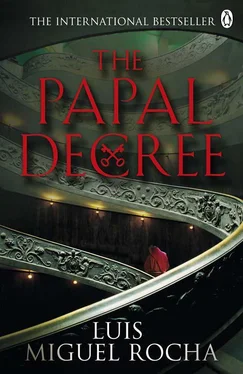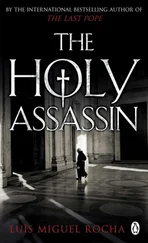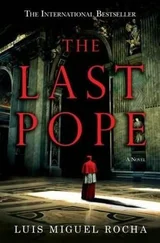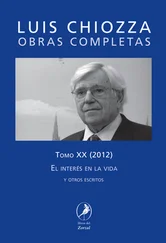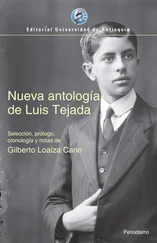Luis Rocha - Papal decree
Здесь есть возможность читать онлайн «Luis Rocha - Papal decree» весь текст электронной книги совершенно бесплатно (целиком полную версию без сокращений). В некоторых случаях можно слушать аудио, скачать через торрент в формате fb2 и присутствует краткое содержание. Жанр: Триллер, на английском языке. Описание произведения, (предисловие) а так же отзывы посетителей доступны на портале библиотеки ЛибКат.
- Название:Papal decree
- Автор:
- Жанр:
- Год:неизвестен
- ISBN:нет данных
- Рейтинг книги:4 / 5. Голосов: 1
-
Избранное:Добавить в избранное
- Отзывы:
-
Ваша оценка:
- 80
- 1
- 2
- 3
- 4
- 5
Papal decree: краткое содержание, описание и аннотация
Предлагаем к чтению аннотацию, описание, краткое содержание или предисловие (зависит от того, что написал сам автор книги «Papal decree»). Если вы не нашли необходимую информацию о книге — напишите в комментариях, мы постараемся отыскать её.
Papal decree — читать онлайн бесплатно полную книгу (весь текст) целиком
Ниже представлен текст книги, разбитый по страницам. Система сохранения места последней прочитанной страницы, позволяет с удобством читать онлайн бесплатно книгу «Papal decree», без необходимости каждый раз заново искать на чём Вы остановились. Поставьте закладку, и сможете в любой момент перейти на страницу, на которой закончили чтение.
Интервал:
Закладка:
‘No. It means we give too much importance to thinking. Thought exists for practical purposes, not for speculation. Thought exists for me to say that it’s cold outside, and so I have to dress warmly, not for saying, Oh, damn, it’s cold outside. The hell with the weather.’
‘But through thought I know who I am, who I was — I have a notion of my history,’ the first cardinal argued.
‘A false notion of self. A false notion of your own history. The self is the root of the problem.’
‘What are you saying? Why false?’
‘Because everything is mixed up here,’ Hans said, pointing at his head. ‘The real, the unreal, the imaginary, the past, desires, dreams.’
‘Can we not distinguish between reality and dream?’
Schmidt stopped for a moment and smiled. ‘I’ll give you an example. Do you remember the last trip you took?’ he said to the cardinal.
‘Very well,’ His Eminence replied.
‘Can you tell us where it was?’
‘Certainly. Croatia. I was in Zagreb a few days.’
‘Think of a place in Zagreb where you were.’
‘I’m doing so.’
‘Where was it?’
‘The cathedral.’
‘Now imagine me next to you. Can you see us having coffee on the esplanade of Ban Jelacic Square?’
The cardinal said nothing, and a sarcastic smile faded from his lips.
‘We’re not able to distinguish what actually happened from what we wish had happened or from a suggestion that might have happened,’ Schmidt explained with passion. ‘The past serves for nothing. It’s not for remembering or for mentally reviving. It was what it was, and there is nothing you can do to change it. Certainly, it’s not worth crying over. It’s not worth judging ourselves and others.’ He paused briefly. ‘Salvation is always in the present. We can only make a difference in our life now. Not yesterday, not tomorrow, only now.’
The room looked at him in silence. The prefect, the secretary, the cardinal counselors shifted their papers and moved uncomfortably in their chairs, impatient, constrained, some dry coughing, others with too much phlegm.
‘I ask myself,’ the secretary began, ‘if you realize the outrages you’ve told this congregation. You’ve polluted this holy place with a mountain of heresies.’
There was a concurring mutter and shaking of heads around the table.
‘Salvation is always in our Lord Jesus Christ,’ the secretary added, gaining the approval of the prefect.
‘I agree with Your Eminence,’ Schmidt affirmed.
‘But not completely,’ added Cardinal Ricard.
‘The extent of my agreement isn’t important. As I said previously, believing or not believing is equally correct.’
The cardinal got up indignantly. ‘There is only one belief,’ he shouted. ‘In our Lord Jesus Christ. It was He who said the kingdom of God is always at hand.’ He stuck his finger in the air, as if that sanctioned what he said.
Schmidt chuckled.
‘When Jesus said that He was not talking about time.’
‘What was He talking about, then?’ Secretary Ladaria asked.
Schmidt looked at his listeners with a genuine smile. He was very amused. ‘About distance.’
‘Distance? Explain that, please.’ William spoke now. He’d been silent so far.
‘Jesus meant that the kingdom of God, salvation, was near, that is, it was ready, within reach of anyone. But he wasn’t talking about a place or time…’ He let his words sink in before proceeding. ‘He was referring to a state or condition.’
‘A state,’ the secretary repeated, as if awakening from a trance. ‘And what state was that?’
‘The state of illumination.’
The entire congregation waited for an explanation.
‘Jesus almost always lived in this state,’ Schmidt continued. ‘It’s what happens when you live free from permanent control of the mind. The mind judges, classifies, files everything that surrounds it. It’s hot, cold, bad, good… this one’s an idiot, that one’s a thief, and everything is conspiring against us… Everything that passes before our eyes suffers instant classification. It happens often we meet a person, and in five minutes we’ve formed a fixed opinion. We like him or not, according to our mental classification. Nothing is more erroneous.’
Indignation was growing among the counselors. The prefect was the only one who showed no reaction.
‘Jesus didn’t judge and classify things. He was in a permanent state of enlightenment. Always in contact with the vital energy of the universe. He didn’t make value judgments or predictions, didn’t worry about problems that might or might not occur, and never tried to imagine how to correct things, because things never happen as we imagine. Jesus didn’t live in the past or in the future, only in the one state in which one can live: the present. Consider the lilies of the field. They neither toil nor spin, He said. There is no other way to live. You can’t do it thinking about what is going to happen in five minutes or ten or an hour, a day or a year. We can only make a difference now in the present. Jesus made all the difference living in this way.’
No one said anything for some time. They didn’t know what to say. The counselors tried to assimilate the outrageous words that the reverend Austrian father had uttered with such fervent passion. The entire session was a horrendous profanation of the holy, a sacrilege. In a way that Schmidt might have considered disrespectful, if he were a man given to classification, the counselors began whispering among themselves. William stayed out of the conversation in the beginning, but was compelled to intervene when whispering turned into a murmur and, later, into a heated altercation.
‘Gentlemen,’ the voice of Schmidt, whom everyone had forgotten about, broke in. ‘Reverend Prefect, Mr. Secretary, and Your Eminences, I understand that you don’t agree with me. I want to tell you that my first duty and priority is to the church, which I serve and obey, in humility and abnegation.’ With those final words he lowered his head in a gesture of submission until he showed his bare neck to indicate he was at their mercy.
The prefect of the Congregation for the Doctrine of the Faith rose from his chair, assumed an arrogant pose that matched his function, and looked at Reverend Father Hans Matthaus Schmidt sternly.
‘Good… this session was without doubt… intense.’ He hesitated to characterize the proceedings. ‘The prefect and the other counselors will deliberate and — ’
The doors suddenly opening interrupted the prefect’s discourse. Four Swiss Guards, in dress uniform, entered and took position on either side of the door. Four more of their countrymen immediately followed.
‘What’s going on?’ the prefect wanted to know.
One of the guards, clearly the most senior, advanced to the center of the room.
‘This room is sealed until further notice.’
‘How ridiculous,’ the secretary spoke up. ‘You owe us respect, Daniel.’
‘I’m sorry, Your Eminences, but there has been a breach of security. At this time I have maximum responsibility for the Vatican. I beg your understanding.’
‘A security breach? What happened?’ the prefect asked.
Daniel hesitated. He didn’t know if he had to answer.
‘Don’t keep it secret, Daniel. What happened?’ William insisted.
‘A murder within the walls of the Vatican,’ the commander of the Pontifical Swiss Guard explained.
‘My dear God,’ the prefect let slip and sat down exhausted.
‘But who?’ the secretary inquired.
‘I’m not authorized to say. I am sorry to inform you that no one may enter or leave until further notice.’ He turned his back and looked at the Austrian priest. ‘Father Hans Schmidt?’
Читать дальшеИнтервал:
Закладка:
Похожие книги на «Papal decree»
Представляем Вашему вниманию похожие книги на «Papal decree» списком для выбора. Мы отобрали схожую по названию и смыслу литературу в надежде предоставить читателям больше вариантов отыскать новые, интересные, ещё непрочитанные произведения.
Обсуждение, отзывы о книге «Papal decree» и просто собственные мнения читателей. Оставьте ваши комментарии, напишите, что Вы думаете о произведении, его смысле или главных героях. Укажите что конкретно понравилось, а что нет, и почему Вы так считаете.
